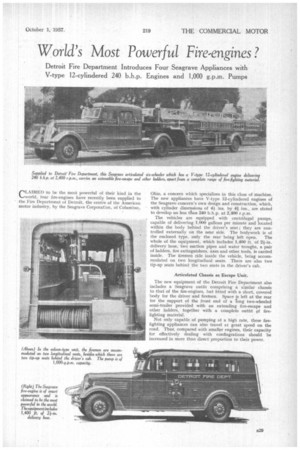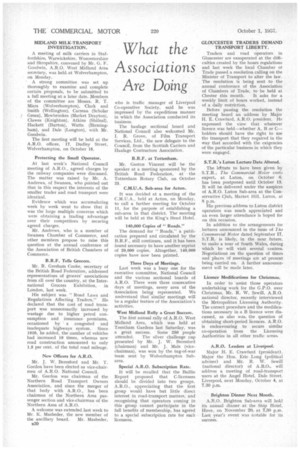World's Most Powerful Fire-engines?
Page 39

Page 40

If you've noticed an error in this article please click here to report it so we can fix it.
Detroit Fire Department Introduces Four Seagrave Appliances with V-type 12-cylindered 240 b.1-1.p. Engines and 1,000 g.p.m. Pumps
CI.AIMED to be the most powerful of their kind in the ‘...world, tour fire-engines have recently been supplied to
• the Fire Department of Detroit, the centre of the American motor industry, by the Seagrave Corporation, of Columbus, Ohio, a concern which specializes in this class of machine. The new appliances have V-type 12-cylindered engines of the Seagrave concern's own design and construction, which, with cylinder dimensions of 41 ins, by 41 ins., are stated to develop no less than 240 b.h.p. at 2,400 r.p.m.
The vehicles are equipped with centrifugal pumps, capable of delivering 1,000 gallons per minute and located within the body behind the driver's seat ; they are controlled externally on the near side. The bodywork is of the enclosed type, only the rear being left open. The whole of the equipment, which includes' 1,400 ft. of 21-in. delivery hose, two suction pipes and water troughs, a pair of ladders, fire extinguishers. axes and other tools, is carried inside. The firemen ride inside the vehicle, being accommodated on two longitudinal seats. There are also two tip-up seats behind the two seats in the driver's cab, Articulated Chassis as Escape Unit.
The new equipment of the Detroit Fire Department also includes a Seagrave outfit comprising a similar chassis to that of the fire-engines, but fitted with a short, covered body for the driver and firemen. Space is left at the rear for the support of the front end of a tong two-wheeled semi-trailer provided with an extending fire-escape and other ladders, together with a complete outfit pf firefighting material.
Not only capable of pumping at a high rate, these firefighting appliances can also travel at great speed on the road. Thus, compared with smaller engines, their capacity for effectively dealing with conflagrations should be increased in more than direct proportion to their power. MIDLAND MILK-TRANSPORT INVESTIGATION.
A meeting of milk carriers in Staffordshire, Warwickshire, Worcestershire and Shropshire, convened by Mr. G. F. Goodwin, A.R,O. West Midland Area secretary, was held. at Wolverhampton, on Monday.
A strong committee was set up thoroughly to examine and complete certain proposals, to be submitted to a full meeting at a later date. Members of the committee are Messrs. R. T. Miers (Wolverhampton), Clark and Smith (Wellington), Carman (Scholar Green), Mew brookes (Market Drayton), Clawes (Knighton), Atkins (Shifnal), Hackett (Burton), Watts (Birmingham), and Dale (Longton), with Mr. Goodwin.
The first meeting will be held at the A.R.O. offices, 17, Dudley Street, Wolverhampton, on October 15.
Protecting the Small Operator.
At last week's National Council meeting of A.R.O., agreed charges by the railway companies were discussed. The matter was raised by Mr. A. Andrews, of Swansea, who pointed out that in this respect the interests of the smaller trader and road transport were identical.
Evidence which was accumulating week by week went to show that it was the large multiple concerns which were obtaining a trading advantage over their competitors by securing agreed charges.
Mr. Andrews, who is a member of Swansea Chamber of Commerce, and other members propose to raise this question at the annual conference of the Association of British Chambers of Commerce.
B.R.F. Tells Grocers.
Mr. R. Gresham Cooke, secretary of the British Road Federation, addressed representatives of grocers' associations from all over the country, at the International Grocers Exhibition, in London, last week.
His subject was " Road Laws and Regulations Affecting Traders." He declared that the cost of road transport was unnecessarily increased by wastage due to higher petrol consumption and insurance premiums, occasioned by a congested and inadequate highways system. Since 1910, he added, the number of vehicles had increased 19 times, whereas new road construction amounted to only 1.5 per cent, of the total road mileage.
New Officers for A.R.O.
Mr. 5. W. Beresford and Mr. 1'. Gordon have been elected as vice-chairmen of A.R.O. National Council.
Mr. Gordon was chairman of the Northern Road Transport Owners Association, and since the merger of that body with A.R.O., has been chairman of the Northern Area passenger section and vice-chairman of the Northern Area of A.R.O.
A welcome was extended last week to Mr. K. Masheder, the new member of the ancillary board. Mr. Masheder, n30




















































































